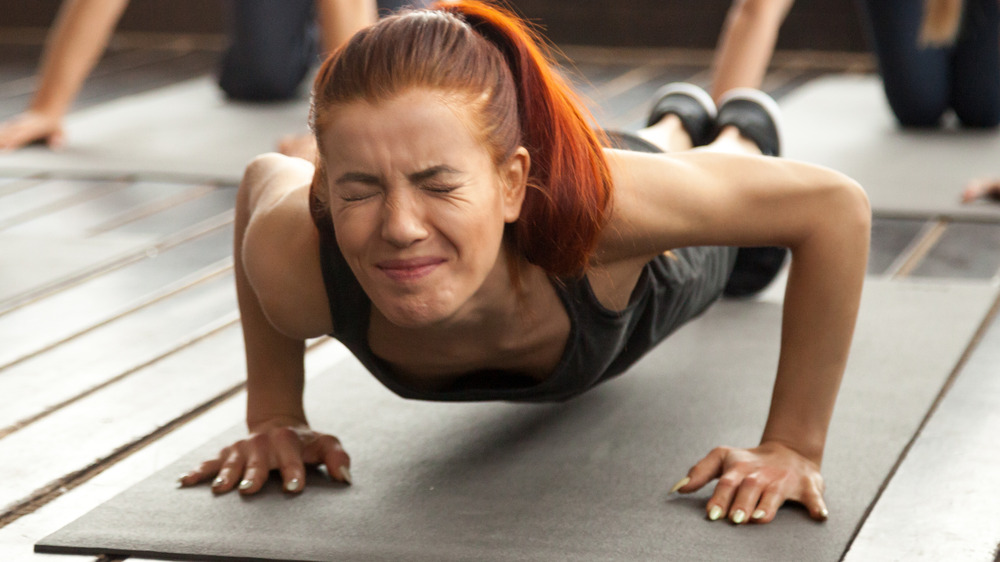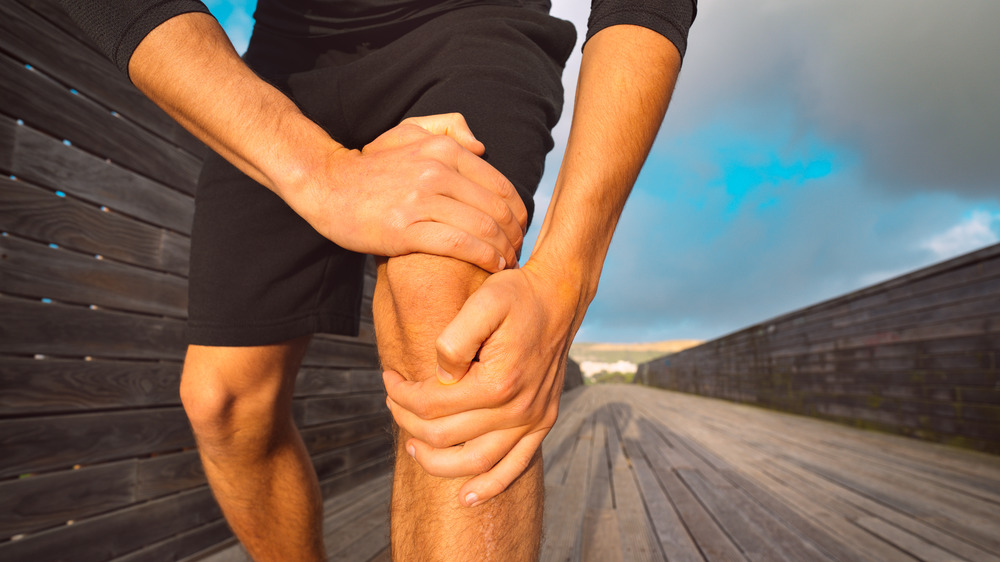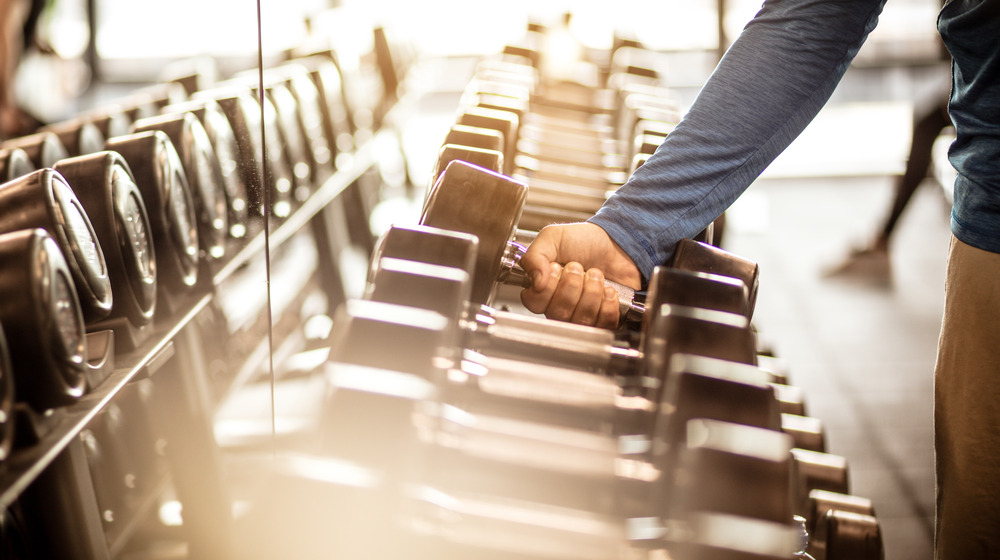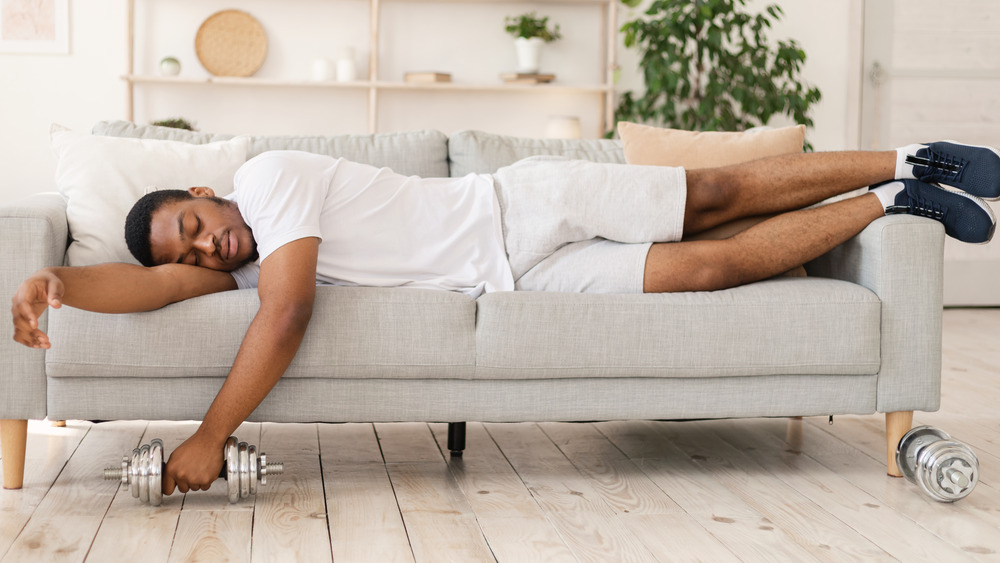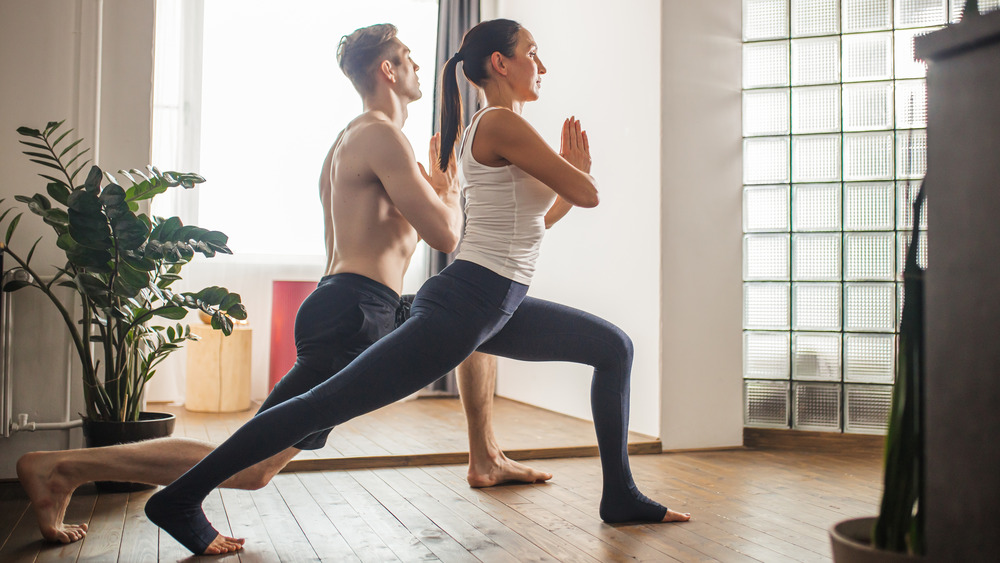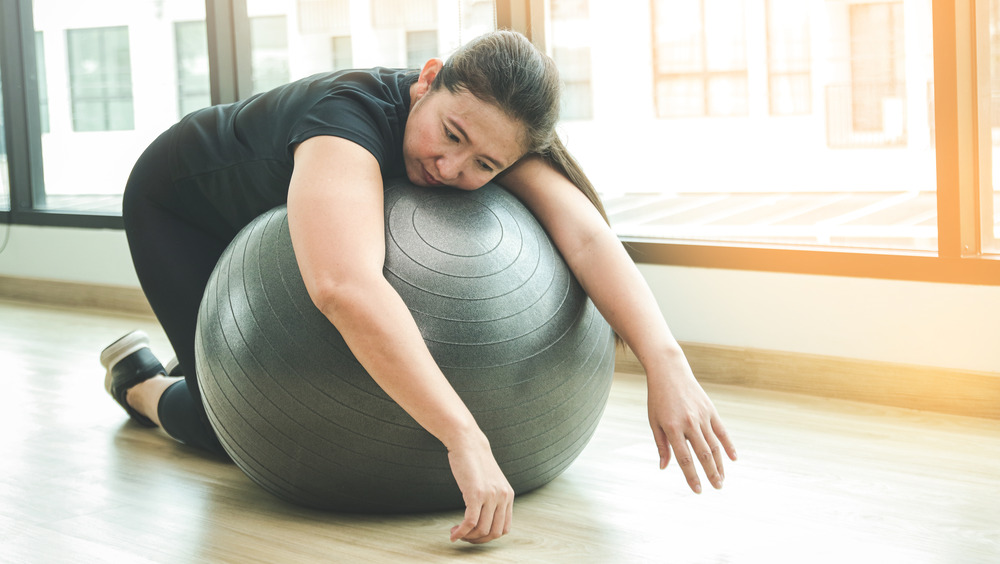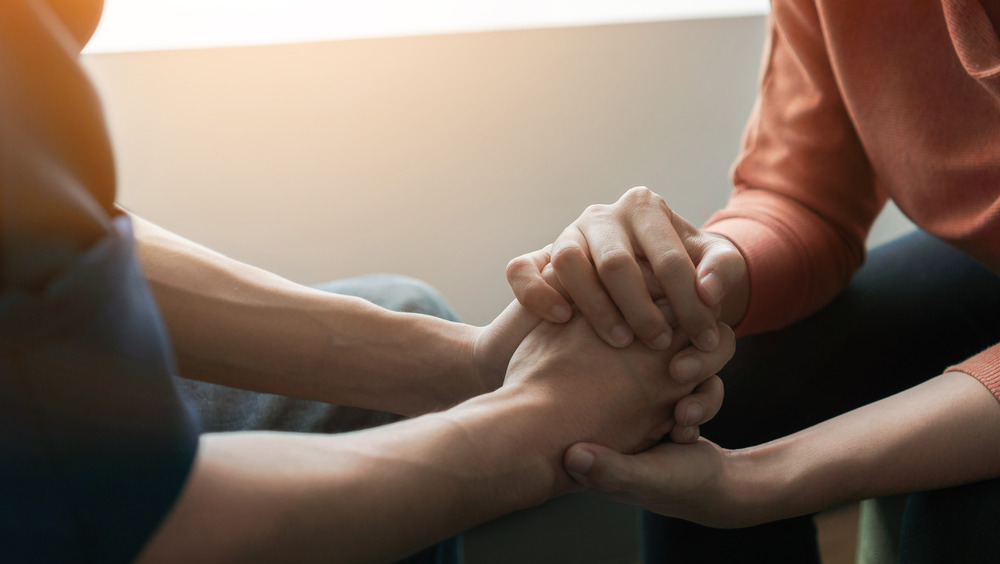Ways Your Workout Could Be Doing Damage To Your Body
It's no secret that working out is one of the most important things a person can do for their physical and mental health (via Medline Plus). The Centers for Disease Control and Prevention notes that working out has a positive impact on our brain health, cardiovascular health, and mental health. Plus, it can even help us live longer. But while there are countless benefits to exercise, there are also some downsides and risks if you push your body too much or have developed poor exercise habits.
During a workout, people can get caught up in the moment and push through pain, ignore their form, dismiss symptoms like excessive dizziness, and not recognize other ways their work out routine could be impacting their physical and mental well-being. While you can be sure that exercise has many proven benefits, it's also important to recognize ways your workout could be doing damage to your body. Let's get into it.
Painful workouts can cause serious harm
Oftentimes while working out people think they should be pushing through pain. And while, sure, feeling the burn while doing squats is normal, actual pain is not. Sports medicine physician Dominic King told Cleveland Clinic's Health Essentials, "Pain represents injury." He added that pain can be the result of "overuse or too much stress placed on a muscle or tendon."
Additionally, Jasmine Marcus, a New York-based physical therapist, told Insider, "Pain is your body's way of protecting you and it most likely means you are injuring yourself." According to the publication, you should stop working out and seek medical attention if you experience "sharp, stabbing, or severe" pain or "swelling, bruising, or any sort of open wound." It's important to listen to your body because pushing through pain could end up causing or worsening a real injury, and not to mention force you to sit out of workouts for longer.
Weight training when you're out of shape can cause this potentially deadly condition
If you're trying to get in better shape, your workouts likely are getting slightly more and more difficult as you progress. But sometimes people try to jump right into harder workouts, like strenuous weightlifting, before they are ready. This can lead to serious medical problems.
According to the Journal of the American Academy of Physician Assistants, "Exertional rhabdomyolysis is a clinical condition caused by intense, repetitive exercise or a sudden increase in exercise in an untrained person." This condition, which is also known as rhabdo, involves the breakdown of muscle tissue that leads to the release of muscle fiber contents into the bloodstream (via CDC). This can cause kidney damage and seizures. In severe cases, rhabdo can even cause acute kidney failure and even death.
So how do people avoid this dangerous condition? Well, a 2014 clinical review in Sports Health says that repetitive heavy weightlifting, overheating, and dehydration all contribute to the risk of rhabdo. So staying hydrated, making sure you're giving your body a break, and building up slowly to heavier weights are all ways to avoid rhabdo.
If you get really dizzy or lightheaded during your workouts, you might want to see a doctor
Dizziness or lightheadedness can be a tricky symptom to monitor because it's not uncommon to feel that way, at least briefly, after a particularly difficult workout (via Healthline). But if you're feeling dizzy long after your workout or if you get lightheaded even after light exercise, it's a good idea to seek medical assistance.
Dr. Roshini Raj wrote in Health that dizziness while working out can have simple fixes, like drinking more fluids or not pushing yourself as hard. But he also added that "feeling the spins at the gym can be related to exercise-induced asthma." This can be treated with an inhaler to use before you hit the gym. And in more serious cases, Dr. Raj explained that "dizziness during a workout could signal an underlying heart problem, one of which is an abnormal rhythm, called an arrhythmia."
If you're frequently feeling dizzy during or after exercising, check with your doctor and always make sure you're properly hydrating, eating enough before you exercise, and taking breaks when your body needs it.
Getting sick a lot? It could be your workouts
Exercising has been proven to help boost your immune system, but according to sports and orthopedic physical therapist Mitchell Starkman, overtraining can actually make you get sick more often.
Starkman told Insider, "Exercise is an amazing thing and it, when done consistently, actually boosts our immune system over time. That being said, when [training is too intense], after our workouts the body's immunity actually slightly drops for a few hours, making us more susceptible to sickness." So if you're finding yourself falling ill a lot during intense periods of training, make sure to take rest days and nourish your body with the fuel it needs both before and after your workouts.
Immune system expert Dr. Jen Tan told A. Vogel that flu-like symptoms after exercise can stem from poor nutrition and inadequate hydration. Nevertheless, that may not always be the root of the problem. "Finding the cause of your flu-like symptoms after exercise is the first step towards finding an effective treatment," he explained. "After a doctor has ruled out any underlying health concerns, often a few simple changes will help to minimise these symptoms."
Chest pain while working out is cause for concern
Exercise is extremely important in preventing health conditions like heart disease, but in some cases, pushing too hard while working out can trigger a heart attack. There are certain types of soreness that are okay to push through while working out, but if you feel a pain in your chest, don't try to push through it. According to the Cleveland Clinic, there are many reasons why your chest could be hurting — one of which is heart trouble.
According to Dr. Debra Sullivan with Healthline, any type of chest pain is cause for concern while working out. Sullivan spoke about heart attacks while working out and said that not all heart attacks begin with sharp pain. She wrote, "Many begin with a feeling of mild discomfort, uncomfortable pressure, squeezing, or fullness in the center of the chest. The pain can be subtle and may come and go, so it can be difficult to tell what's wrong."
So if you experience chest pain while working out, Sullivan suggests stopping and seeking medical attention if your chest continues to hurt or if your heart continues to race for more than a few minutes.
Exercising too much during the day could be keeping you up at night
While Johns Hopkins Medicine reports that exercising can help benefit your quality of sleep, there are multiple factors that could also actually be causing the opposite effect: insomnia. Chelsea Axe, a board-certified chiropractic physician and certified strength and conditioning specialist, spoke to Insider and explained, "Insomnia is a sign that your sympathetic nervous system is not functioning healthily and is directly linked to exercising too much."
Axe went on and explained that strenuous exercises like sprinting or heavy weightlifting can cause an overactive sympathetic nervous system, which can make you feel restless. If you're experiencing insomnia after difficult workouts, John Hopkins Medicine suggests exercising earlier in the day and scaling back on the intensity and frequency of workouts.
"We really want to encourage people to exercise, just be mindful of timing and whether it seems to affect your ability to get optimal sleep quality," Charlene Gamaldo, medical director of Johns Hopkins Center for Sleep at Howard County General Hospital, told Johns Hopkins Medicine.
Working out in extreme heat can lead to serious heat-related illnesses
Regardless of how strenuous your workout is, it's always important to take care of yourself as temperatures rise. Whether you're playing sports outside in the summer or doing an indoor hot yoga class in the winter, extreme heat can be life threatening even for the best athletes.
According to the Mayo Clinic, "Exercising in hot weather puts extra stress on your body. If you don't take care when exercising in the heat, you risk serious illness." And the CDC reports that each year, more than 700 people in the United States die from extreme heat-related incidents.
Mayo Clinic says some signs to look out for when watching for heat-related illnesses include muscle cramps, nausea, weakness, headache, excessive sweating, and dizziness. If you do develop any of these symptoms, you'll need to lower your body temperature by stopping your workout, getting out of the heat, and getting hydrated. It's also ideal to have someone stay with you to help monitor your symptoms. The moral of the story: Be extremely careful when exercising in extreme heat!
Being tired after a workout is normal, but "excessive fatigue is not"
It's normal to feel tired after a strenuous workout, but extreme fatigue for long periods of time might be cause for concern. If you're working out frequently and find yourself tired all the time and if you always leave the gym feeling rundown rather than energized, your body might be telling you to take a break.
Megan Ostler, a registered dietitian and the director of nutrition at iFit, told Insider, "Sore muscles are common with a new routine, but excessive fatigue is not. If you are getting adequate sleep and are still super tired, there [might be] a couple of reasons."
Some of those reasons include iron-deficiency anemia and not giving your body the fuel it needs both before and after your workout. So if you're frequently exhausted after exercising, check with your doctor about your symptoms and make sure you're eating enough both pre- and post-workout.
Poor form doesn't only look sloppy, it can lead to serious injury
If you've ever worked out with a fitness professional, they probably focused on your form — and that's for good reason! Poor form, especially when doing strenuous activities like weightlifting, can lead to serious injury. Acupuncturist Jamie Starkey told the Cleveland Clinic that "recurring pain connected with sports often is due to incorrect form or technique. If you can catch these errors early, you can retrain yourself so that you avoid re-injury or chronic recurrences."
And if you aren't working with an exercise buddy or trainer, it's important to check your own form and catch yourself if you get sloppy. Personal Trainer Rocky Snyder told Aaptiv that if you're working out alone, there are still plenty of ways to make sure your form is on point. He suggests recording yourself, standing in front of a mirror, easing into workouts, and of course, stopping if you're in pain.
If you lose your appetite, you may need to scale back on your workouts
If you start a new training regime, you may feel hungrier as you burn more calories and your body adapts — that much is normal. But if you find yourself completely losing your appetite after exercising, your body might be trying to tell you something.
Megan Ostler, a registered dietitian and the director of nutrition at iFit, told Insider, "Many athletes assume that they can just follow their hunger cues to know how much to eat. However, that isn't always the case. If you are working out at a high level your appetite might actually be suppressed." Dr. Rebecca Crochiere agreed, telling told Runner's World, "Some evidence suggests that following exercise, hormones are released that reduce hunger and food intake."
So if you're working out at a high level and notice you've lost your appetite, that's your body giving you another important reminder to take rest days. Loss of appetite could be a sign that you're overtraining.
Forgetting to stretch can make you more prone to injuries
If you're one of those people who likes to hurry home right after a workout or show up just as a class starts, you might want to rethink this routine and give yourself a little more time to stretch. We've all heard it thousands of times, but stretching really is so important and omitting it from a workout could make you more prone to injuries.
According to Harvard Health Letter, without stretching our "muscles shorten and become tight. Then, when you call on the muscles for activity, they are weak and unable to extend all the way. That puts you at risk for joint pain, strains, and muscle damage."
And stretching isn't only important to avoid injury, it's actually good for you. According to Healthline, stretching can "help boost your flexibility, reduce the risk of injury, and decrease muscle tension in your body." The publication also added that it "can even help improve your performance the next time you work out."
Exercising too much can have a negative impact on your mental health
While the Mayo Clinic has stated that exercise helps ease depression and anxiety symptoms, overdoing it with exercise could actually have the opposite effect. Chelsea Axe, a board-certified chiropractic physician and certified strength and conditioning specialist, spoke to Insider and explained, "Too much aerobic activity can lead to parasympathetic overtraining. Symptoms of this include fatigue, depression, and impaired sports performance."
Axe continued on, sharing another way over-exercising could have a negative impact on mental health. She said, "Overtrained athletes can also suffer from adrenal dysfunction, in addition to mood disorders exacerbated by excessive cortisol levels in the body."
So at the end of the day, while exercise is good for both our physical and mental well being, it's all about balance and taking breaks when you feel like you could be overdoing it. Regardless of your workouts, though, if you're dealing with ongoing mental health struggles, it's best to talk to a licensed mental health professional, like a therapist.
Dreading your workouts? This could be a red flag
We've all been there before: You don't feel like exercising — at all — but once you do, you feel so much better. That's completely relatable and totally normal. But if you frequently dread your workouts and don't perk up during or after exercising, it might mean it's time to take a step back and reevaluate your training schedule.
Sports medicine physician Dr. Jordan Metzl told Shape, "Your fitness routine should be one of the most fun things you do all day long. So if you're not smiling, it's important to think about why." He says that "just not feeling" your workouts is actually a sign that you are overdoing it.
Dr. Metzl noted that if you're still dreading training halfway through your workout, he suggests leaving, going home, and brainstorming ways to switch up your routine. And if your workout schedule doesn't include at least one if not two rest days per week, Metzl strongly recommends adding them in.
Excessive exercising could be a sign of an eating disorder
Working out has countless benefits but, like anything, it's possible to have too much of a good thing. Fitness regimes require balance and if your exercising is getting in the way of your social life or relationships with your family and friends, it could be time to take a step back and reevaluate.
Personal trainer Franklin Antoian told The Healthy, "If your friends, family members, and co-workers are consistently telling you that you work out too much, they may be correct." While working out and staying healthy are important, so is spending time with your loved ones.
It's also important to note that Hope Eating Disorders classifies excessive exercise as a form of an eating disorder. According to their site excessively exercising means "prioritizing exercise foremost in life, rather than including exercise in a balanced lifestyle." So if you or someone you know needs help in this space, it's best to talk to a licensed mental health professional like a therapist.
If you are struggling with an eating disorder, or know someone who is, help is available. Visit the National Eating Disorders Association (NEDA) website or contact NEDA's Live Helpline at 1-800-931-2237. You can also receive 24/7 Crisis Support via text (text NEDA to 741741).

